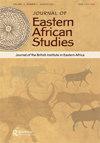政治、先知和武装动员:南苏丹冲突中权力登记的竞争和连续性
IF 0.6
3区 社会学
Q2 AREA STUDIES
引用次数: 5
摘要
精神和神的权威在武装暴力的动员中起着突出的作用。本文提供了南苏丹当代努尔女先知(guan kuoth)的微观历史,她动员了数百名武装人员,包括支持当前的反政府叛乱。这篇文章在她对kume(广义的政府概念)和习惯法的研究方法中,试图抓住明显的矛盾。这位女先知拒绝与神有关的权威逻辑。与此同时,她支持语言的连续性和习俗权威的想象,这与政府在这一背景下的权威登记有着深刻的联系。这篇文章认为,这位女先知的方法的核心是她试图推翻历史上政府将机构的政治和宗教性质分开的举措,并断言没有政府的治理是可能的。以前没有神的统治的尝试已经打断了习惯法提供治疗的能力,包括从精神上和身体上的杀戮危险。她动员人民武装起来的能力部分是基于重建习惯法背后的神圣权威的政治主张。本文章由计算机程序翻译,如有差异,请以英文原文为准。
Politics, prophets and armed mobilizations: competition and continuity over registers of authority in South Sudan’s conflicts
ABSTRACT Spiritual and divine authorities play a prominent role in mobilizing armed violence. This article provides a micro-history of a contemporary Nuer prophetess (guan kuoth) in South Sudan who mobilized hundreds of armed men including in support of current anti-government rebellions. The article grapples with apparent paradoxes in her approach to kume (a broadly defined notion of government) and customary law. This prophetess rejects logics of authority associated with the kume. At the same time, she champions the continuity of the language and imaginaries of customary authority that are deeply associated with government registers of authority in this context. The article argues that at the heart of the prophetess’s approach is her attempt to overturn historic government initiatives that separated the political and religious nature of institutions, and to assert that governance without government is possible. Previous attempts to govern without the divine have interrupted the customary law’s ability to offer healing including from the spiritual and physical dangers of killing. Her ability to mobilize people to arms is partly based on political claims to reconstitute the divine authority behind the customary law.
求助全文
通过发布文献求助,成功后即可免费获取论文全文。
去求助
来源期刊

Journal of Eastern African Studies
AREA STUDIES-
CiteScore
3.30
自引率
7.10%
发文量
12
期刊介绍:
Journal of Eastern African Studies is an international publication of the British Institute in Eastern Africa, published four times each year. It aims to promote fresh scholarly enquiry on the region from within the humanities and the social sciences, and to encourage work that communicates across disciplinary boundaries. It seeks to foster inter-disciplinary analysis, strong comparative perspectives, and research employing the most significant theoretical or methodological approaches for the region.
 求助内容:
求助内容: 应助结果提醒方式:
应助结果提醒方式:


